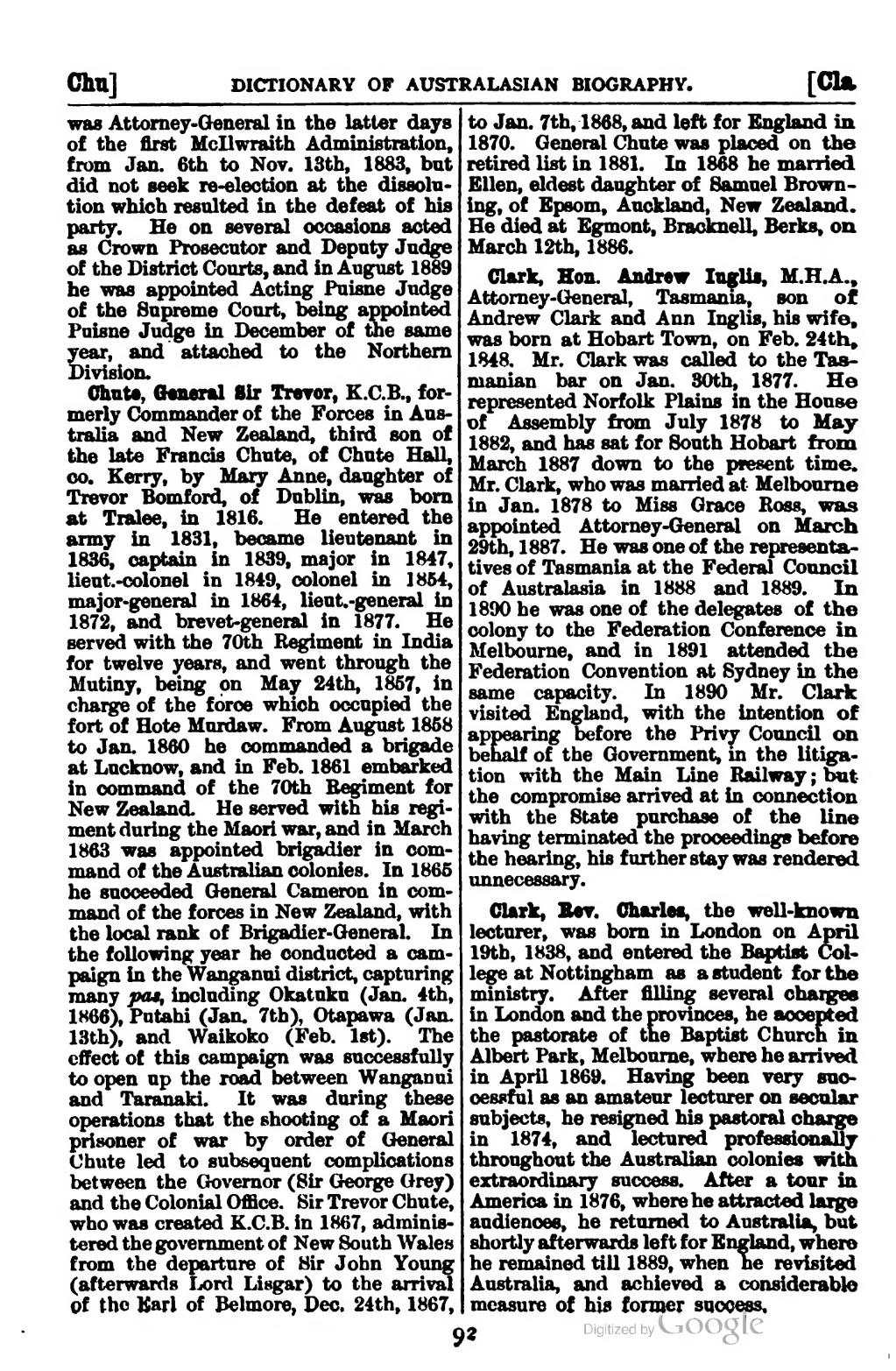was Attorney-General in the latter days of the first McIlwraith Administration, from Jan. 6th to Nov. 13th, 1883, but did not seek re-election at the dissolution which resulted in the defeat of his party. He on several occasions acted as Crown Prosecutor and Deputy Judge of the District Courts, and in August 1889 he was appointed Acting Puisne Judge of the Supreme Court, being appointed Puisne Judge in December of the same year, and attached to the Northern Division.
Chute, General Sir Trevor, K.C.B., formerly Commander of the Forces in Australia and New Zealand, third son of the late Francis Chute, of Chute Hall, co. Kerry, by Mary Anne, daughter of Trevor Bomford, of Dublin, was born at Tralee, in 1816. He entered the army in 1831, became lieutenant in 1836, captain in 1839, major in 1847, lieut.-colonel in 1849, colonel in 1854, major-general in 1864, lieut.-general in 1872, and brevet-general in 1877. He served with the 70th Regiment in India for twelve years, and went through the Mutiny, being on May 24th, 1857, in charge of the force which occupied the fort of Hote Murdaw. From August 1858 to Jan. 1860 he commanded a brigade at Lucknow, and in Feb. 1861 embarked in command of the 70th Regiment for New Zealand. He served with his regiment during the Maori war, and in March 1863 was appointed brigadier in command of the Australian colonies. In 1865 he succeeded General Cameron in command of the forces in New Zealand, with the local rank of Brigadier-General. In the following year he conducted a campaign in the Wanganui district, capturing many pas, including Okatuku (Jan. 4th, 1866), Putahi (Jan. 7th), Otapawa (Jan. 13th), and Waikoko (Feb. 1st). The effect of this campaign was successfully to open up the road between Wanganui and Taranaki. It was during these operations that the shooting of a Maori prisoner of war by order of General Chute led to subsequent complications between the Governor (Sir George Grey) and the Colonial Office. Sir Trevor Chute, who was created K.C.B. in 1867, administered the government of New South Wales from the departure of Sir John Young (afterwards Lord Lisgar) to the arrival of the Earl of Belmore, Dec. 24th, 1867, to Jan. 7th, 1868, and left for England in 1870. General Chute was placed on the retired list in 1881. In 1868 he married Ellen, eldest daughter of Samuel Browning, of Epsom, Auckland, New Zealand. He died at Egmont, Bracknell, Berks, on March 12th, 1886.
Clark, Hon. Andrew Inglis, M.H.A., Attorney-General, Tasmania, son of Andrew Clark and Ann Inglis, his wife, was born at Hobart Town, on Feb. 24th, 1848. Mr. Clark was called to the Tasmanian bar on Jan. 30th, 1877. He represented Norfolk Plains in the House of Assembly from July 1878 to May 1882, and has sat for South Hobart from March 1887 down to the present time. Mr. Clark, who was married at Melbourne in Jan. 1878 to Miss Grace Ross, was appointed Attorney-General on March 29th, 1887. He was one of the representatives of Tasmania at the Federal Council of Australasia in 1888 and 1889. In 1890 he was one of the delegates of the colony to the Federation Conference in Melbourne, and in 1891 attended the Federation Convention at Sydney in the same capacity. In 1890 Mr. Clark visited England, with the intention of appearing before the Privy Council on behalf of the Government, in the litigation with the Main Line Railway; but the compromise arrived at in connection with the State purchase of the line having terminated the proceedings before the hearing, his further stay was rendered unnecessary.
Clark, Rev. Charles, the well-known lecturer, was born in London on April 19th, 1838, and entered the Baptist College at Nottingham as a student for the ministry. After filling several charges in London and the provinces, he accepted the pastorate of the Baptist Church in Albert Park, Melbourne, where he arrived in April 1869. Having been very successful as an amateur lecturer on secular subjects, he resigned his pastoral charge in 1874, and lectured professionally throughout the Australian colonies with extraordinary success. After a tour in America in 1876, where he attracted large audiences, he returned to Australia, but shortly afterwards left for England, where he remained till 1889, when he revisited Australia, and achieved a considerable measure of his former success.
92
